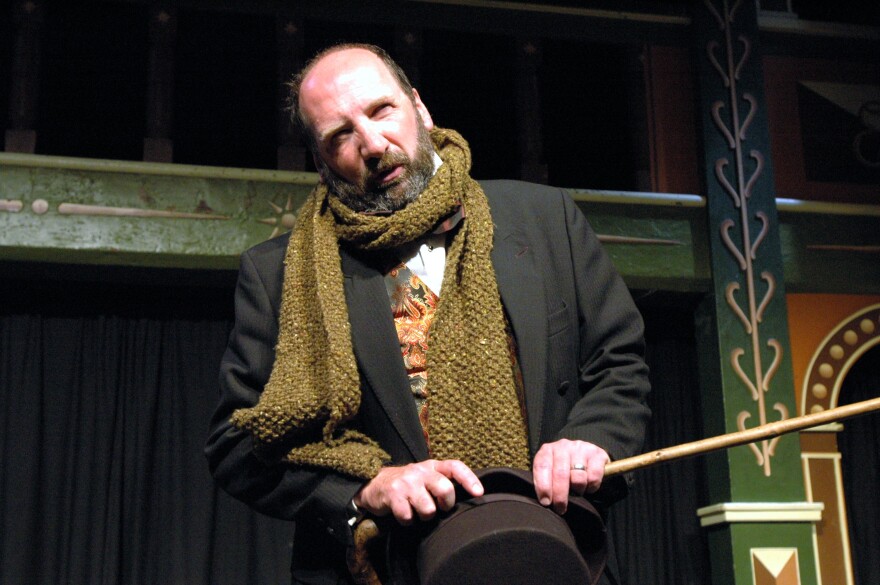A Charles Dickens will perform the classic novel “A Christmas Carol” in Portland on Monday, Nov. 27. That’s Gerald Charles Dickens — the novelist’s great, great grandson.
The younger Dickens has been touring the world and performing the writer’s works for decades. On Monday, he’ll be at Portland’s historic First Parish Church with his one-man version of the classic Christmas tale.
Maine Things Considered Host Nora Flaherty interviewed Dickens, who says he’s always loved theater, but growing up, didn’t have much passion for the writings of his famous ancestor.
This interview has been edited for clarity.
Dickens: It didn’t make an immediate hit with me. We had to study “Oliver Twist” at school when I was a teenager and I hated it. We trolled our way through 900 pages I couldn’t abide it. It just seemed very dull and overlong and tedious to me. So I kind of swore that I wouldn’t have anything to do with Dickens and that it had no interest to me. And many years later I was approached to do a reading of “A Christmas Carol” in the style that Charles Dickens had done when he toured and performed, and that was the first time I discovered that he loved theater and had this passion for the stage as well. So that intrigued me. And as soon as I started preparing the reading and I discovered how theatrical all of these characters were and how the story leaps from scene to scene and emotion to emotion and atmosphere to atmosphere, it suddenly became a fantastically written theater script. And that’s what really excited me about it. I’d also watched a stage adaptation of “Nicholas Nickleby” at the Royal Shakespeare Company and Britain had staged and that just blew me away — it exploded off the stage. I began to think, “All right. I sort of misjudged this guy. Maybe I need to give him a second chance,” which was very noble of me, I know. I just absolutely fell in love with his work. And that’s how the connection came about. All through theater.
Flaherty: When people come to see the show what can they expect?

Dickens: Well I hope exactly that — a theatrical event that they will get completely wrapped up in. The thing about “A Christmas Carol,” more than any of his other books, is that so many people, especially in America, have a very personal attachment to it, whether it’s listening to a grandparent reading it to them when they were kids or watching their favorite movie version or going to a community theater production. But everybody has a connection with “The Christmas Carol.” My show relies very much on Dickens’ original text, and I let the words do the work and hopefully all of the audience becomes part of the show as well. That they are experiencing everything that’s going on, that they are crying with Bob Cratchit when we’re mourning Tiny Tim, laughing as Scrooge leaps up on Christmas morning. And that’s what I try to achieve, to make everybody part of the show.
Flaherty: As you say, “A Christmas Carol” isn’t just a novel, it has become a huge part of Christmas. What is it like having such a close relationship both in your work and also in your family with something so very iconic?
Dickens: It’s very difficult to actually comprehend, really. And sometimes it’s better not to try, because it’s such a huge achievement, that Charles Dickens came up with when he wrote this little book. It’s extraordinary, especially in America, the passion for “A Christmas Carol” and for Dickens, and as a family member that makes you incredibly proud to see, that even now in 2017 he still has that appreciation throughout this country. It’s extraordinary. Dickens was very much a self-made man. He was sort of living the American dream in Britain. He had a dream, he wanted to achieve something, he didn’t come from a good family, he didn’t have rich parents, but he worked and he worked and he worked until he achieved what he wanted to achieve. That sells very well in America. People love that story of pulling yourself up and achieving something.
Flaherty: As you tell this story year in, year out — that is so iconic and so important to how Americans and I think also English people view Christmas — do you worry about sort of going over to the cheesy side?
Dickens: I try not to, I try to maintain the honesty of what Dickens wrote. The wonderful thing about any of Dickens’ books is that he got his message across. And there’s a deep, deep message in “A Christmas Carol” of the need to be honest about poverty and to close that huge gap between the rich and the poor. That’s what he was talking about. But he never lectured his readers. He never battered them with with his message — he entertained them. So “A Christmas Carol” is by nature a very entertaining book. It has some huge laughs in it, it has some wonderful points, but then it has some incredibly dark sequences as well, which are so important to the success of this story. So you have to respect that, you have to keep all that. Tiny Tim, God bless him, doesn’t feature a huge amount in my show. We don’t have really, really cutesy, “God bless us everyone.”
This story was originally published Nov. 27, 2017 at 3:35 p.m. ET.



